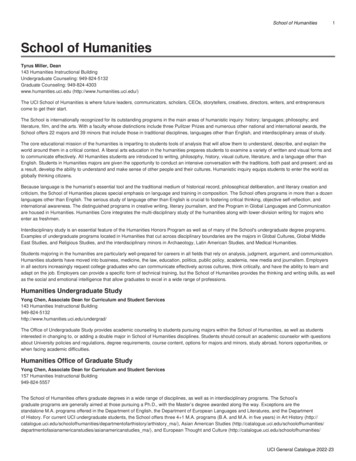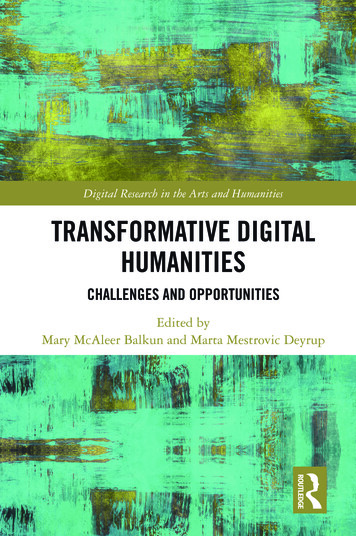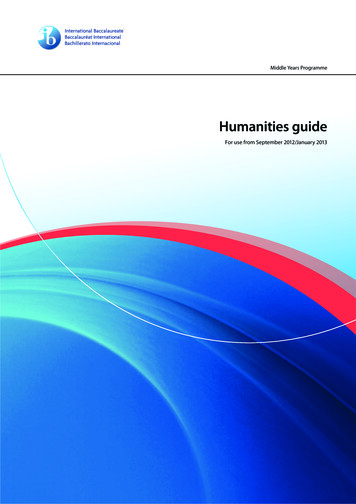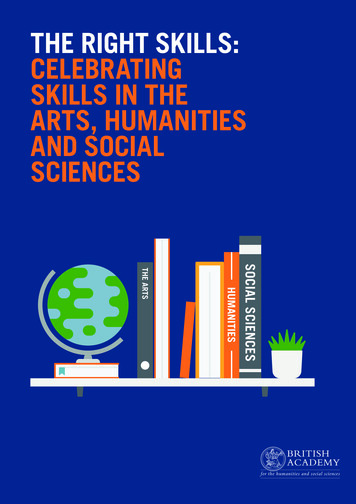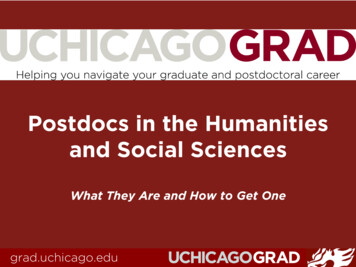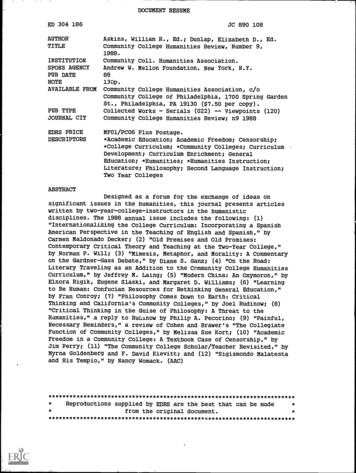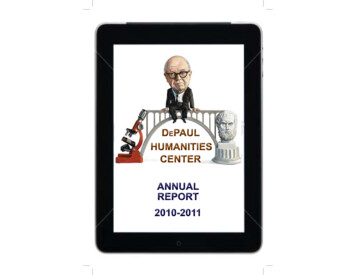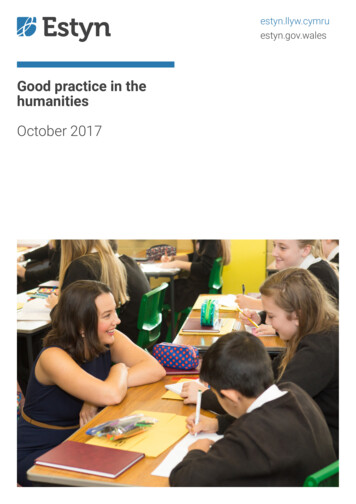
Transcription
estyn.llyw.cymruestyn.gov.walesGood practice in thehumanitiesOctober 2017
The purpose of Estyn is to inspect quality and standards in education andtraining in Wales. Estyn is responsible for inspecting: nursery schools and settings that are maintained by, or receive funding from,local authorities primary schools secondary schools all-age schools special schools pupil referral units all-age schools independent schools further education independent specialist colleges adult community learning local authority education services for children and young people teacher education and training Welsh for adults work-based learning learning in the justice sectorEstyn also: provides advice on quality and standards in education and training in Wales tothe National Assembly for Wales and others makes public good practice based on inspection evidenceEvery possible care has been taken to ensure that the information in this document isaccurate at the time of going to press. Any enquiries or comments regarding thisdocument/publication should be addressed to:Publication SectionEstynAnchor CourtKeen RoadCardiffCF24 5JW or by email to publications@estyn.gov.walesThis and other Estyn publications are available on our website: www.estyn.gov.wales Crown Copyright 2017: This report may be re-used free of charge in anyformat or medium provided that it is re-used accurately and not used in amisleading context. The material must be acknowledged as Crown copyrightand the title of the document/publication specified.
ContentsPageIntroduction1Background1Main findings3Recommendations6Standards7Key stage 2Key stage 3Key stage 4Examination outcomes at key stage 47889Provision14Curriculum planning and planning for progressionDevelopment of literacy, numeracy and digital competencyDevelopment of the Welsh dimension and the international perspectiveEnrichment and experiencesTeaching and assessmentSuccessful Futures – A Curriculum for Wales141923252831Leadership and management32Primary schoolsSecondary schools3234Appendix 1: Teacher assessments at key stage 336Appendix 2: Questions for schools to consider as part of theirself-evaluation38Appendix 3: Evidence base40Glossary41References42
Good practice in the humanitiesIntroductionThis report is written in response to a request for advice from the Welsh Governmentin the Minister’s annual remit letter to Estyn for 2016-2017. The report examinesstandards, provision and leadership of the humanities at key stages 2, 3 and 4 inschools where good practice has been identified.The report is intended for the Welsh Government, headteachers and staff in schools,local authorities and regional consortia. It may be of interest to schools looking toinnovate in light of the recommendations made in Successful Futures. The reportincludes case studies of interesting or innovative practice for schools to consider.These case studies are intended to encourage schools to reflect on their currentpractice.The findings of the report are based on an analysis of findings from visits to 19schools. During the visits, inspectors observed lessons, scrutinised curriculum plans,held discussions with senior and middle leaders, interviewed pupils and scrutinisedpupils’ work.For the purpose of this report, the term humanities refers to history and geography.BackgroundHistory and geography are taught in the Foundation Phase in the ‘knowledge andunderstanding of the world’ area of learning, are compulsory subjects in the NationalCurriculum at key stage 2 and key stage 3, and are optional subjects at key stage 4(Great Britain, 2002). The decision to make the humanities compulsory until the endof key stage 3 shows the importance that is placed on the contribution that thesesubjects make to a broad and balanced education.The requirements of the Welsh Assembly Government curriculum guidancedocuments (2008a, 2008b, 2008c) are that:‘Schools should develop in every learner a sense of personal and cultural identitythat is receptive and respectful towards others. Schools should plan across thecurriculum to develop the knowledge and understanding, skills, values and attitudesthat will enable learners to participate in our multi-ethnic society in Wales. Schoolsshould develop approaches that support the ethnic and cultural identities of alllearners and reflect a range of perspectives, to engage learners and prepare them forlife as global citizens.’ (Welsh Assembly Government, 2008b, p. 4)Since the establishment of the national curriculum, there has been little evaluation ofthe role of humanities within education. In 2013, a task and finish group chaired byDr Elin Jones produced a report for the Welsh Government on The Cwricwlwm1
Good practice in the humanitiesCymreig, history and the story of Wales. The main recommendations about historyfrom the report include: A committee of history specialists should be established, to includerepresentatives from every sector of education and relevant organisations suchas museums. This committee would be responsible for:o promoting co-operation between schools and the sharing of good practiceo developing benchmarks of good practice in historyo quality-assuring the resources published on Hwbo recommending new resources to be developed In the revision of the national curriculum, the programme of study should bestructured so as to provide clear guidance on the relationship between local,Welsh, British, European and world history. The aim should be to provide asound foundation for learners’ historical understanding while expanding theirhorizons. Numerous, specific and diverse examples of schemes of work with a focus onlocal and Welsh history in its wider context should be developed for key stages 2and 3. Once these have been quality-assured, they should be stored on Hwband updated regularly. A proportion of Welsh history should be an integrated and compulsory part ofevery history GCSE specification offered in Wales. In reviewing the qualifications, consideration should be given to strengtheningthe element of history in the Welsh Baccalaureate. Government-funded heritage organisations should be strongly encouraged toprovide easy access for schools to the materials they develop, in both Welsh andEnglish, so they can be used in the classroom setting. All such resources should emphasise the provisional nature of history and thediversity of experience in all periods. Where appropriate, it should help learnersto contrast and compare the experiences of different groups of people in allperiods. (Welsh Government, 2013, page 21)In March 2014, The Welsh Government asked Professor Graham Donaldson toconduct an Independent Review of Curriculum and Assessment Arrangements inWales. In February 2015, ‘Successful Futures’ was published. The report states that‘the humanities provides fascinating contexts for children and young people to learnabout people, place, time and belief’ and ‘provides rich opportunities for learningbeyond the school walls, for example through exploring the local environment andlearning from the experience of people and organisations and businesses in thecommunity.’ (Donaldson, 2015, p. 46)2
Good practice in the humanitiesMain findingsStandards1In the schools visited, most pupils have a positive attitude towards the humanitiesand are highly motivated. Pupils enjoy the variety of tasks, the study of currentissues, and the opportunity to engage in learning beyond the classroom.2At key stage 2, most pupils are independent learners and show resilience when theyfind tasks difficult. They identify similarities and differences between places and usea range of interesting resources to draw conclusions about places or events.3At key stage 3, many pupils are confident in making links between and withinhumanities topics, for example linking tectonic activity and agriculture. In manylessons, nearly all pupils skim a range of text to extract relevant information. Mostpupils share their ideas clearly and justify their opinions.4At key stage 4, most pupils demonstrate strong prior learning and can apply thisknowledge to a new context. In history, pupils analyse sources perceptively andproduce well-structured extended writing. In geography, they develop theirunderstanding of the natural world and our relationship with it.Provision5Across schools, curriculum planning models vary. Primary schools mainly adopt athematic approach to curriculum planning, while in secondary schools there are avariety of approaches including the thematic approach and traditional teaching of theseparate humanities subjects.6Planning for progression in humanities from the Foundation Phase to key stage 2 iswell developed. However, planning for progression from key stage 2 to key stage 3 isweak. This is because curriculum transition arrangements most frequently focus onthe core subjects. At all key stages, humanities teachers plan to ensure thedevelopment of pupils’ literacy and numeracy skills. The planning for thedevelopment of pupils’ information and communication technology (ICT) skills is morevariable, particularly at key stage 3 and key stage 4.7Pupils value the enrichment experiences provided by the humanities, such asfieldwork and educational visits. In the best examples, teachers ensure that pupilshave a secure knowledge of their local history and an appreciation of their locality.Pupils make a clear link between these activities and their learning. Most leadersmake effective use of the pupil development grant (PDG) to ensure equal access tothese opportunities.8In highly-effective lessons, teachers plan well to build on prior knowledge andmaximise progress. These lessons include a skilful blend of subject knowledge andthe development of pupils’ skills. Particularly at key stage 2, pupils are frequentlyinvolved in the planning for their learning, within and beyond the classroom. Pupilsdiscuss with their teachers the topics they wish to study and teachers plan interesting3
Good practice in the humanitieslessons that match the interests and respond to the questions pupils raise. Usingpupils’ enquiries, teachers offer a broad range of enrichment experiences to pupilsand parents and pupils choose to complete those activities that interest them. At keystage 4, the strong emphasis on examination technique and outcomes limits therange of learning experiences provided to pupils.9Many secondary schools have comprehensive and effective systems in place to trackthe progress of pupils across the humanities. However, at key stage 2, the trackingof pupil progress across the humanities is underdeveloped. At both key stage 2 andkey stage 3, there is very little standardisation and moderation of pupils’ humanitieswork.Leadership and management10In a minority of the schools visited, leaders clearly articulate the guiding principles oftheir curriculum design. These principles may include links to real-life learning,first-hand experiences and opportunities for investigation and problem solving tocreate independent, resilient learners. However, the majority of leaders have notarticulated, or in some cases considered, the ‘core purposes’ or ‘guiding principles’that are at the heart of their curriculum planning.11In the most effective schools, senior leaders understand the importance of thehumanities subjects in a broad and balanced curriculum. These senior leadersunderstand the strong role that the humanities can play in developing pupils’ skillswithin a relevant context.12In most primary schools visited, the humanities have not had a high enough priority inwhole-school planning. This is mainly due to the strong focus given to improvingstandards in literacy and numeracy. In the last year, most of the primary schoolsvisited have begun to adapt their curriculum to respond to the recommendations fromSuccessful Futures (Donaldson, 2015). In the most recent development plans, thehumanities are being reviewed and planned for as one of the six areas of learning.13In all primary schools visited, the quality of teaching is monitored closely. However,in only a minority of cases are the strengths and areas for development in humanitiesteaching well understood. In these schools, information from monitoring activities isused well to share good practice and provide support as necessary. The level ofsubject expertise in the humanities varies greatly between staff. However, all theschools make strong use of internal staff expertise to ensure that all pupils receive aneffective learning experience in their humanities lessons.14In many of the secondary schools visited, self-evaluation and improvement planningin the humanities subjects is strong. In these schools, self-evaluation processeshave identified clearly the impact of curriculum changes on the quality of provisionand outcomes. However, in a minority of schools, the evaluation of changes to thecurriculum is underdeveloped.15In nearly all the secondary schools visited, leaders have a clear understanding of thestrengths and areas for development in the teaching of humanities. In a fewdepartments there is a lack of sharing of good practice and in a very few there isinconsistency in the quality of teaching. In a few of the secondary schools visited,4
Good practice in the humanitiesnon-subject specialists teach the humanities, especially at key stage 3. In the bestpractice, there are appropriate support systems in place to ensure that all staffteaching outside their have specialist area receive appropriate support.16During initial teacher training, primary teachers receive limited guidance in theteaching of humanities. In secondary schools, opportunities for extending teachers’professional development in the humanities, other than courses related toexaminations, are limited. There is a lack of subject-specific support from many localauthorities and regional consortia.Summary of the characteristics of good practice in the humanities Leaders understand and support the place of humanities in a broad and balancedcurriculum. Teachers skilfully blend the development of subject knowledge and pupil skills.They develop pupils’ literacy, numeracy and ICT skills within a relevant context. Teachers use a wide variety of stimulating, relevant and current resources in theirlessons. Teachers make effective use of the school locality. Pupils enjoy the wide variety of activities teachers provide and the opportunity tolearn outside the classroom.5
Good practice in the humanitiesRecommendationsSchools should:R1 Ensure a balance between the development of pupils’ skills and of theirknowledge and understanding of subject contentR2 Ensure that pupils’ learning experiences in the humanities are wide-ranging,interesting, progressive and challenging, particularly at key stage 4R3 Monitor the progress that pupils make in the humanities more closelyR4 Evaluate the curriculum for the humanities to prepare for the development andimplementation of the new area of learning and experienceR5 Establish local networks of good practice to share resources and expertise,including making greater use of the schools’ localityLocal authorities and regional consortia should:R6 Provide better professional learning opportunities for teachers of the humanitiesR7 Provide more support for schools to evaluate their curriculum and to plan for thedevelopment of the humanities area of learning and experienceThe Welsh Government should:R8 Ensure that initial teacher education courses provide new teachers includingprimary teachers with the necessary skills to teach the humanities successfullyand to respond to the new Curriculum for Wales6
Good practice in the humanitiesStandards17At all key stages, most pupils in the schools visited have a very positive attitudetowards their studies in humanities. Pupils enjoy the variety of tasks, the study ofcurrent issues and the opportunity to engage in learning beyond the classroom. Avery few pupils are not fully engaged with their learning, remaining passive,particularly during question and answer sessions.Key stage 218At key stage 2, the standards in history and geography are very similar. In thelessons observed, a majority of pupils make strong progress and a minority makeexceptional progress. In the schools visited, nearly all pupils, show strong levels ofengagement, with many being highly motivated. Most pupils show resilience whenthey find tasks difficult and are highly independent learners.19When studying historical topics most pupils use a range of sources effectively todraw conclusions, for example about life during Tudor times. Many pupils have aclear understanding of bias and can distinguish between primary and secondarysources of evidence accurately and understand why their validity may differ.20When studying geographical topics pupils often compare a contrasting locality withWales. Nearly all pupils identify similarities and differences between placesaccurately. Many pupils can skim and scan text well to extract information, forexample when explaining why people chose to live near volcanoes.21Nearly all pupils write to the same standard in humanities lessons as they do indiscrete language lessons. They are able to use their knowledge of appropriategenres to present their work successfully. Most pupils write accurately showing agood grasp of spelling and grammar. They use a sophisticated range of vocabularywell, including subject specific language. Most pupils show good listening skills andmake strong oral contributions to class discussions. Most pupils use subject specificterminology accurately, for example when explaining the water cycle.22Most pupils can successfully apply their numeracy skills in the context of humanitiestopics. This is most frequently seen in geographical topics, for example using a scaleto calculate the distance from Cardiff to other European cities or calculating the mostcost-efficient type of renewable energy. Many pupils have well-developed ICT skills,working collaboratively on documents, recording presentations and independentlycompiling databases and spreadsheets.23Most pupils use their thinking skills creatively when faced with a new challenge orrationally when asked to interpret pictorial evidence. Many pupils co-operate verywell with their peers to solve problems effectively.24At key stage 2, there is no nationally held data for the outcomes of pupils in historyand geography. This lack of parity in accountability between core and non-coresubjects may impact on the importance leaders place on the provision for andmonitoring of the humanities.7
Good practice in the humanitiesKey stage 325At key stage 3, in the schools visited, there are many common features in thestandards achieved by pupils in both history and geography. Around half of pupilsmake strong progress, while a minority make exceptional progress. In many lessons,nearly all pupils show high levels of motivation and a positive attitude towards theirwork. These pupils work well independently and are resilient when faced withchallenging tasks. Most pupils show pride in their work, which is well presented andwell organised.26In many lessons, nearly all pupils show strong reading skills, for example skimmingtext to evaluate different methods of protecting communities from earthquakes. Mostpupils participate effectively in discussions. They share clearly their ideas and justifytheir opinions, using subject-specific terminology, for example when discussingpolitical conflict in Russia.27In many lessons, nearly all pupils select, combine and summarise information from arange of sources. Many pupils are confident when writing at length. These pupilsindependently structure their writing well, for example when explaining how and whyWorld War 1 ended. Many pupils write well-balanced pieces of work expressing andjustifying their views clearly and show a good understanding of other viewpoints.These pupils write strong pieces of evaluative writing, for example when makingjudgements about General Haig’s leadership of the Battle of the Somme. Manypupils demonstrate strong numeracy skills in their humanities lessons. The analysisand interpretation of graphical data in geography are a particular strength.28Many pupils in both history and geography are confident in making links between andwithin topics, such as understanding the link between tectonic activity and the use ofareas for agriculture and tourism, and making links between Nazi beliefs on botheducation and role of women in society during that period of history.29A few pupils make limited progress as they spend too long on low-level tasks such ascutting out statements and sticking in sheets. A very few pupils do not structure theirwork well enough and make more spelling, punctuation and grammatical errors thanwould be expected for their age and ability. These pupils do not maintain the samestandards of presentation and organisation in their humanities books as seen in theirother subjects.30At key stage 3, in teacher assessments in 2016 most pupils achieve the expectedlevel 5 or above. There is little difference in the outcomes between history andgeography. Appendix 1 provides more detail about teacher assessments ingeography and history.Key stage 431In the schools visited, around half of pupils make excellent progress, while a minoritymade strong progress. In many lessons, most pupils demonstrate strong priorlearning and are able to apply this knowledge successfully to a new context. Manypupils make strong oral contributions that are perceptive and thoughtful. Thesepupils make effective, articulate contributions to class discussions and make stronguse of subject specific vocabulary. Many pupils work effectively in groups to supporteach other’s learning8
Good practice in the humanities32In many lessons, nearly all pupils show strong reading skills, for example when usinginference to understand the purpose of Nazi propaganda. Most pupils producewell-structured pieces of high-quality extended writing. They write clearly using abroad range of subject vocabulary and their technical accuracy is good.33In history, many pupils confidently undertake sophisticated analyses of a range ofsources. A majority of pupils analyse sources perceptively, including considering thereliability and usefulness of information. However, a few pupils copy evidence fromsources rather than summarising the information provided. As seen at key stage 3the analysis of data in geography is a strength. For example, pupils are able to plot,describe and explain the movement of pebbles along a beach to illustrate theconcept of longshore drift. However, in a very few lessons, a minority of pupils arenot confident in handling data.34As seen at key stage 3, pupils continue to develop their understanding of linksbetween topics and start to make these connections independently.Examination outcomes at key stage 435At key stage 4, history and geography are optional subjects. A very few pupils take acombined humanities GCSE, around 0.4% of the cohort. A few schools reportreduced contact time at key stage 4 of around 20%. History is the most popular ofthe humanities, accounting for around 4% of total GCSE entries in 2016. In the lastthree years, geography has seen a 13% fall in entries and history an 11% fall.However, the percentage of the cohort taking these subjects has remained broadlysimilar over the last three years, with around 29% taking geography and 34% takinghistory.Figure 1: The number of entries for GCSE geography, history and humanitiesin Wales, 2014-2016 1Year2014201520161Number of entriesGeography History 150Percentage of cohort1Geography History 5%In 2016, this is all pupils in Year 11, excluding those from independent schools. In previousyears, this is all 15-year-olds.Source: Welsh Government, 2016a36There is little difference in the overall performance of pupils at GCSE in history orgeography. However, the proportion of pupils gaining the A*-A grade is highest inhistory at around 29% and lowest in humanities at around 12%. The percentage ofpupils achieving the highest grade has remained at a similar level in the threesubjects for the last three years.19Welsh Government GCSE entry figures for 2017 were not available at the time of publication.However, initial data on entries for 2017 from JCQ indicates that there has been a further drop inGCSE entries for history, geography and humanities (Joint Council for Qualifications, 2017).
Good practice in the humanitiesFigure 2: The percentages of pupils achieving different grades at GCSEgeography, history and humanities, in Wales, 2014-2016Percentage achieving each grade100%90%32% 32% 29%80%29% 31% 28%27% 36% 19%70%60%50%43% 44% 46%40% 40% 41%40%55%49%58%30%UngradedD to GB to CA* to A20%24% 23% 24%10%30% 28% 29%12% 12% 11%0%2014 2015 2016Entries:10,677 9,857 9,289Subject:Geography2014 2015 201612,22111,66710,820History2014 2015 2016119146150HumanitiesSource Welsh Government, 2016a37In geography GCSE, the proportion of pupils achieving A*-C has increased slightlyfrom 67.6% in 2014 to 69.4% in 2016.Figure 3: The number of geography GCSE entries and the percentage of thoseentries achieving an A*-C grade by gender in Wales, ies4,000All 75%A*-C65%A*-C1,0000Girls BoysGirls BoysGirls Boys201420152016Source: Welsh Government, 2016b38In history GCSE, the proportion of pupils achieving A*-C has remained steady at70.1% in 2014 to 70.0% in 2016.10
Good practice in the humanitiesFigure 4: The number of history GCSE entries and the percentage of thoseentries achieving an A*-C grade by gender in Wales, 2014-20167,0006,0006,296entries 5,925entries5,975entries 5,692entries5,610entries 5,210entriesEntries5,0004,000All other 2016Source: Welsh Government, 2016bAt key stage 4, humanities GCSE has a very low number of entries, ranging from 119in 2014 to 150 in 2016. In 2016, 69.3% of pupils achieved A*-C.Figure 5: The number of humanities GCSE entries and the percentage of thoseentries achieving an A*-C grade by gender in Wales, ries60Entries3957entries56entriesAll otherentriesEntries 016Source: Welsh Government, 2016b11
Good practice in the humanities40In general, more girls than boys enter GCSE history and humanities, but geographyhas a greater number of entries from boys.41Girls’ performance is better than that of boys in all humanities subjects at GCSE.Boys’ levels of achievement are very similar across the three subjects.Figure 6: The percentage of humanities GCSE entries that achieve an A*-Cgrade in comparison with the percentage of entries in the core subjects inWales, 2014-2016Number of shLanguageMathematicsWelshPercentage achieving 7%74%65%69%74%Source: Welsh Government, 2016a42In 2016, the percentage of girls achieving A*-C in history or geography is above thepercentage achieving these grades in English language and mathematics, and belowthe percentage achieving Welsh language. Boys’ performance in history andgeography at A*-C in the same year is above that in English language, similar to thatin Welsh, but below that in mathematics.43Pupils eligible for free school meals do not perform as well as other pupils. The gapin performance in history and geography has remained similar at around 26%, for thelast three years. The gap in performance between those pupils eligible for freeschool meals (eFSM) and non-eFSM pupils in history and geography is smaller thanin English, Welsh and mathematics.12
Good practice in the humanitiesFigure 7: The percentage of GCSE entries that achieve an A*-C grade, by the entrants’ free-school-meal lsh1EntriesPupils eligible for 55%Pupils not eligible %4,83977%-26based on 15-year-olds in 2014 and 2015 and on Year 11 pupils on 2016.Source: Welsh Government 2016a13
Good practice in the humanitiesProvisionCurriculum planning and planning for progressionKey stage 244In many primary schools visited, leaders adopt a thematic approach to the delivery ofhumanities. Across these schools, there is variation in the breadth and depth towhich themes are covered. This ranges from the in-depth study of two to threethemes a year or looking at six themes across a year. In a few schools, geographyand history are taught as discrete subjects. Each of these approaches to curriculumplanning has the potential to achieve strong pupil outcomes when well supported byleaders and implemented well with high-quality teaching.Examples of curriculum planning in primary schools:School A chose to cover the same topics, at different levels from early yearsthrough to Year 6. The topics included: time travellers; faraway island; fightingfit; icicles and igloos; and jungle life.School B chose to vary the topics by year group. Year 3 in this school s
humanities subjects in a broad and balanced curriculum. These senior leaders understand the strong role that the humanities can play in developing pupils' skills within a relevant context. 12 In most primary schools visited, the humanities have not had a high enough priority in whole-school planning.


